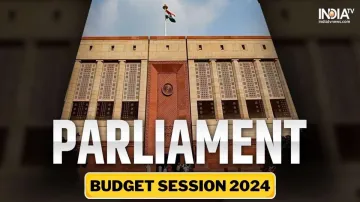Budget 2024: Here's what you can expect from this year's interim budget announcement
The interim budget to be presented by Union Finance Minister Nirmala Sitharaman is expected to feature fiscal measures, including potential tax reductions, aimed at tackling rising prices and addressing ongoing inflationary trends.

Budget 2024: The Budget Session of Parliament is expected to take place from January 31 to February 9, with President Droupadi Murmu delivering the opening address to the joint sitting of Lok Sabha and Rajya Sabha. The interim budget is expected to include fiscal measures, such as potential tax reductions, to address rising prices and ongoing inflationary trends.
Budget deficit
The centre is planning to reduce its budget deficit by at least 50 basis points in 2024-25 from the 2024 target of 5.9 per cent of gross domestic product (GDP). There is an intention to increase capital spending by as much as 20 per cent. A budget deficit occurs when spending exceeds income in an economy.
Increase in tax rebates
Contrary to earlier speculations, the anticipated income tax rebate under the new direct tax regime is unlikely to see an increase in the upcoming Interim Budget 2024, as per a media report. The Finance Minister's announcements related to income tax are closely watched, particularly by salaried individuals who are keenly awaiting potential changes in tax rebates.
According to the report, an official source has dismissed any proposal for an increase in the income tax rebate. The source said, "There is no such proposal," dashing the hopes of those expecting an enhancement in tax benefits.
In the Union Budget 2023, the government had raised the rebate under the new income tax regime from Rs 5 lakh to Rs 7 lakh. Additionally, the basic exemption limit was increased from Rs 2.5 lakh to Rs 3 lakh, and a deduction of Rs 15,000 for family pension was introduced.
Greater allocation for railways
In the fiscal year 2024-25, the budgetary allocation for Indian Railways is expected to reach record levels, signalling a significant investment for a major overhaul of the national transportation system. The government aims to support this transformation by introducing additional modern and faster trains while enhancing safety features.
As per media reports, the capital expenditure (capex) for the railways is likely to see a 25 per cent increase, more than the budget estimate for the fiscal year 2023-24. This would result in a budgetary allocation exceeding Rs 3 lakh crore in 2024-25.
The railway ministry has reportedly requested the rise in planned capex to support long-term infrastructure projects, including the development of freight corridors, faster trains, and the modernization of the overall fleet, including new-age trains, wagons, and locomotives.
Fiscal deficit target
Rating firm ICRA has indicated that it anticipates the government to set a fiscal deficit target of 5.3 per cent of GDP in the upcoming Union Budget for the next fiscal year. The target would represent a midpoint towards the government's commitment to achieve a fiscal deficit of 4.5 per cent of GDP by the fiscal year 2025-26.
TCS exemption
The government may introduce an exemption from tax collected at source (TCS) on overseas credit and debit card spending by individuals, up to Rs 7 lakh per financial year, as per reports. If the proposal is implemented, it would involve an amendment to the Income Tax Act and be included in the Finance Bill for 2024. The potential exemption aims to provide relief to individuals engaging in foreign transactions up to a specified limit.
Direct tax growth rate
Anticipating economic growth in the coming year, the budget is expected to target a 10.50 per cent growth rate in direct taxes. The budgeted net direct tax collection for the current fiscal year is set at Rs 18.2 lakh crore.
READ MORE: Budget Session of Parliament to commence from January 31: Sources